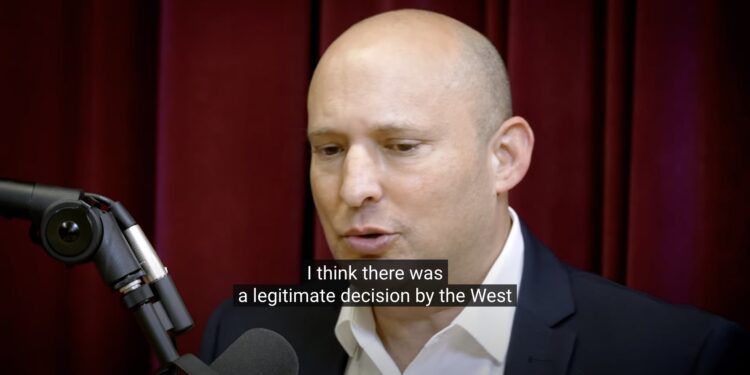Last September, Fiona Hill and Angela Stent wrote this in Foreign Affairs: “According to multiple former senior U.S. officials, in April 2022, Russian and Ukrainian negotiators appeared to have tentatively agreed on the outlines of a negotiated interim settlement.”
In the end, of course, no such settlement was agreed. Which may be, at least in part, because Boris Johnson advised Zelensky not to sign it during his “surprise visit” to Kiev in early April.
As you may recall, one of Zelensky’s “close associates” told Ukrainska Pravda that Johnson was an “obstacle” to negotiations because he’d brought two simple messages: “Putin is a war criminal, he should be suppressed, not negotiated with. And secondly, if you are ready to sign any agreements on guarantees with him, then we are not. We can with you, but not with him, he will still abandon everyone.”
According to Roman Romanyuk, writing in Ukrainska Pravda:
Behind this visit and Johnson’s words lies much more than a simple reluctance to engage in agreements with Russia. The collective West, which back in February suggested that Zelenskyi surrender and run away, now felt that Putin is actually not as all-powerful as they imagined him to be. Moreover, right now there was a chance to “press him”. And the West wants to use it.
It should be noted that Romanyuk disagrees that Johnson’s visit was the main reason the deal fell through. In his view, concerns that “Ukrainian society might not accept such a deal” loomed larger. Others interpret the evidence differently.
Putin himself has claimed the West scuttled negotiations, noting in his September 21st speech that “after certain compromises were coordinated, Kiev was actually ordered to wreck all these agreements”.
Now, the former Israeli PM Naftali Bennett has lent credence to this view, claiming that the West “blocked” a draft peace deal between Russia and Ukraine. The revelation came in a long interview (in Hebrew) posted on Bennett’s YouTube channel.
Bennett’s words cannot be dismissed as mere speculation, given that he played a central role mediating between the two sides, after a request from Zelensky at the war’s outset.
In the interview, Bennett states that he believed Israel’s national interest would be served by a policy of neutrality, which is why he accepted the request to mediate. Toward this end, he sought to understand the interests of both sides.
“Putin’s perception,” he says, “was wait, when the wall came down, we reached an agreement with NATO that they wouldn’t expand … why are you introducing Ukraine into NATO?” Later in the interview, he states that “the war broke out because of the demand to join NATO”.
After a sequence of phone calls with the two leaders, Bennett flew to Moscow on March 7th. (Meanwhile, Russian and Ukrainian negotiators were holding talks at Gomel in Belarus.)
He says that Putin then “made two big concessions”. He promised not to “take out” Zelensky, and he “renounced disarmament of Ukraine”. The same day, Zelensky also “made a big concession” – he “relinquished joining NATO”. Describing these as “huge steps on each side”, Bennett’s impression was that “both sides very much want a ceasefire”.
According to the former Prime Minister, Putin was “very pragmatic”, and “so was Zelensky”. As an example of Putin’s pragmatism, he mentions that Putin “totally understood Zelensky’s political constraints”. Asked whether Putin is “gung ho to fight at all costs”, Bennett replies “no” because “he has goals to achieve”.
Regarding the various Western leaders involved, he says that “Boris Johnson adopted the aggressive line”, whereas “Macron and Scholz were more pragmatic”, and “Biden was both”.
Then we get to the most interesting part. “I think there was a legitimate decision by the West,” Bennett explains, “to keep striking Putin”, to take the “more aggressive approach”. “So they blocked it?” the interviewer asks. “Yes. They blocked it.”
Bennet’s account obviously comports closely with Romanyuk’s observation that the West felt there was a chance to “press” Putin.
One reason to be sceptical is that, insofar as Bennett’s mediation efforts ultimately failed, he has an incentive to blame outside forces (in this case, the West). For now, we can’t be sure exactly what happened. But the revelations are striking, consistent as they are with the earlier report in Ukrainska Pravda – down to the detail of Johnson being particularly hawkish.











To join in with the discussion please make a donation to The Daily Sceptic.
Profanity and abuse will be removed and may lead to a permanent ban.